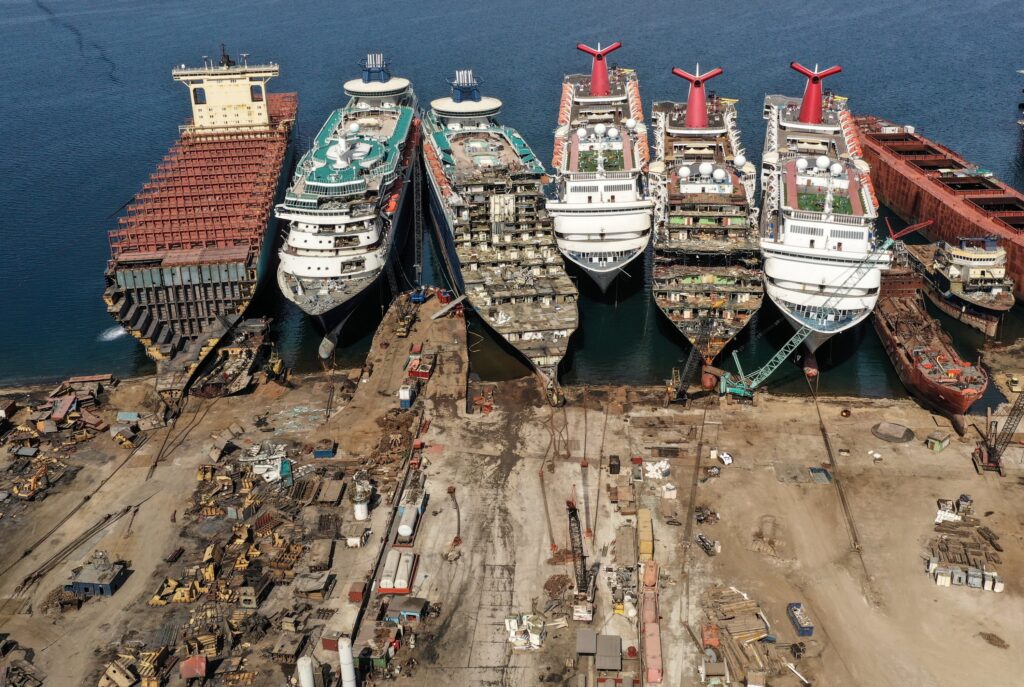Ship recycling, also known as shipbreaking, is a vital industry responsible for dismantling and disposing of old vessels at the end of their operational life. While this industry has often faced environmental and safety concerns, recent years have seen significant strides towards adopting the latest technologies to make ship recycling safer, more efficient, and more environmentally friendly. In this article, we will explore how ship recycling industries are embracing the latest technologies to transform their operations.
Adani port : Cargo activities increased by 17% in August 2023
- Advanced Cutting Techniques
Traditionally, shipbreaking involved manual labor and oxy-fuel cutting methods, which were slow and hazardous. Today, ship recyclers are increasingly turning to advanced cutting techniques such as plasma cutting and water jet cutting. These methods are not only faster but also produce less heat, reducing the risk of fires and hazardous fumes. Moreover, these techniques provide greater precision, allowing for more efficient separation of materials, such as steel, aluminum, and other valuable resources.
- Robotics and Automation
Automation is revolutionizing ship recycling yards. Robots equipped with advanced sensors and artificial intelligence are being used for tasks that were once labor-intensive and risky for humans. These robots can dismantle and segregate materials with high precision, minimizing waste and maximizing the recovery of valuable resources. Additionally, automation reduces the exposure of workers to hazardous materials, enhancing safety standards.
- Environmental Monitoring and Compliance
Environmental concerns have driven ship recycling industries to adopt the latest technologies for monitoring and compliance. Advanced monitoring systems are now in place to track emissions, wastewater discharge, and air quality in and around shipbreaking facilities. This real-time data allows for immediate corrective actions and ensures that operations comply with stringent environmental regulations.
- Green Ship Recycling Facilities
To address environmental concerns, some ship recycling yards are going green by implementing eco-friendly technologies. These facilities invest in renewable energy sources, such as solar panels and wind turbines, to power their operations. They also prioritize the responsible handling and disposal of hazardous materials, ensuring minimal harm to the environment.
- Virtual Reality (VR) Training
Safety training is paramount in ship recycling, given the risks involved. VR technology is being employed to provide immersive training experiences for workers. This technology allows trainees to simulate real-life scenarios in a controlled environment, helping them develop the necessary skills and awareness to perform their tasks safely and effectively.
- Materials Recycling and Reuse
Modern ship recycling facilities are focusing on recycling and reusing as many materials as possible. Advanced separation technologies help extract valuable metals and materials, which can be sold or repurposed for various industries. This reduces waste and minimizes the need for extracting raw materials, contributing to sustainability.
- Data Analytics for Efficiency
Data analytics plays a crucial role in optimizing ship recycling operations. By collecting and analyzing data on equipment performance, worker productivity, and resource utilization, shipbreaking facilities can identify areas for improvement and make informed decisions to enhance efficiency and profitability.
Ship recycling offers a sustainable solution
Ship recycling industries are undergoing a significant transformation by embracing the latest technologies. These innovations not only improve safety and environmental sustainability but also enhance the efficiency and profitability of shipbreaking operations. As the world continues to prioritize sustainability and environmental responsibility, ship recyclers are at the forefront of adopting cutting-edge technologies to meet these demands, making the industry safer and more eco-friendly for the future.







